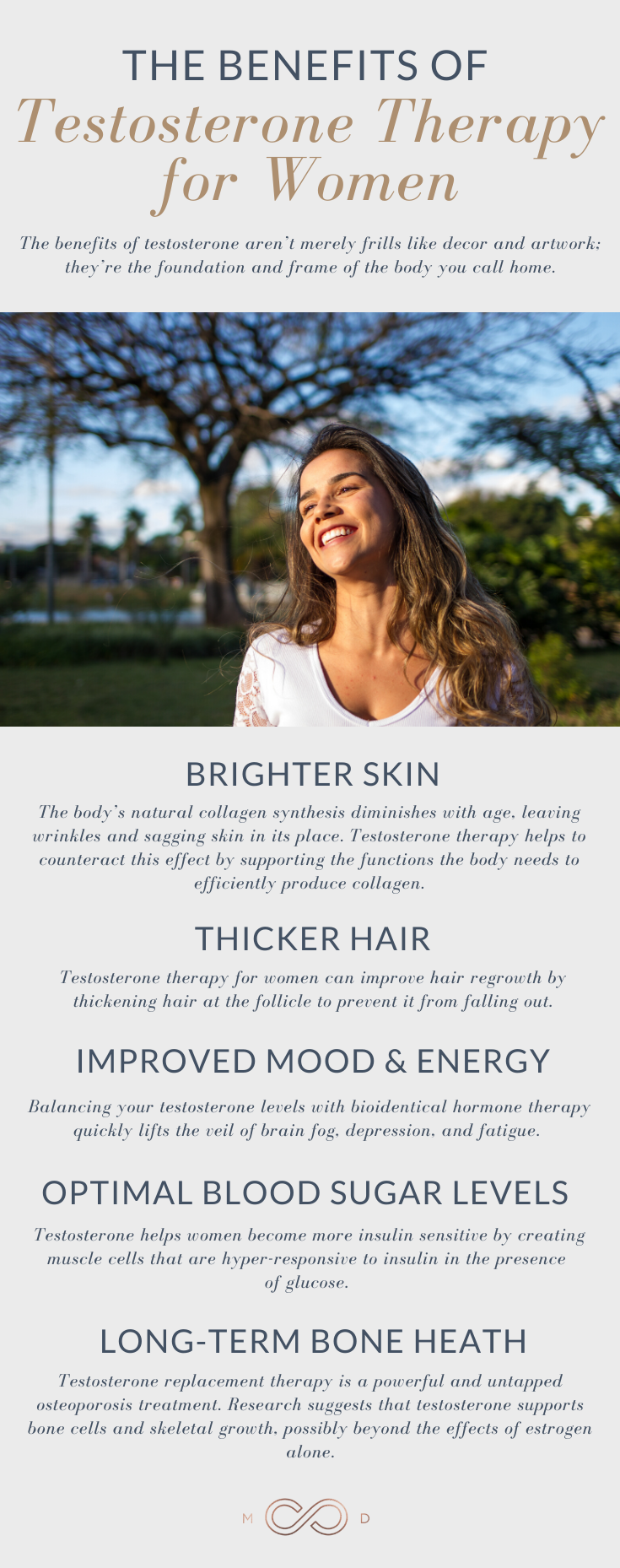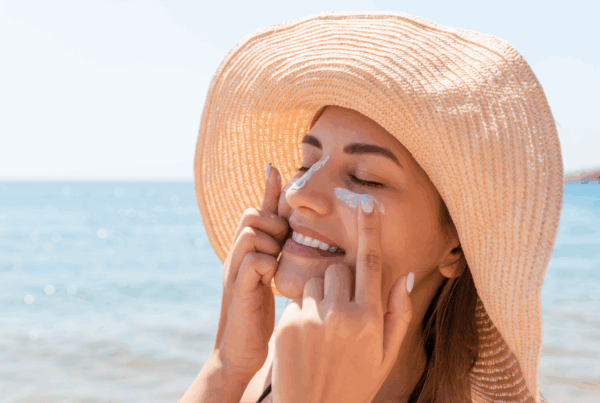It’s no secret that testosterone plays an integral role in male health — from libido and muscle mass to fertility. We’ve all heard commercials for “Low-T” treatments promising to restore male vitality.
Testosterone replacement therapy can transform a man’s health, but we’ve greatly overlooked the influence of testosterone on female health.
Since testosterone has gained such a strong reputation as a “man’s hormone”, the effects of low testosterone on a woman’s health are frequently dismissed. This has caused too much unnecessary suffering in women with low or suboptimal testosterone levels.
My talented partner, Nurse Practitioner Jen Justus, and I are ready to set the record straight. The truth is, testosterone is just as important for women as it is for men. However, few women realize that testosterone therapy could be the answer to their unexplained symptoms — like weight gain and fatigue.
By clearly defining the relationship between testosterone and female health, I hope we can help women like yourself blaze a path toward enhanced wellness with the help of testosterone therapy.
Testosterone For Women’s Health
Testosterone is best known as an essential male sex hormone, but it’s more nuanced than its reputation suggests.
A woman’s ovaries and adrenal glands produce about 20 times less testosterone than a man’s testes. Yet from bone health to fertility, testosterone influences female health just as much as estrogen and progesterone. It’s the preconceived notions about testosterone that lead most of us to fear testosterone therapy for women rather than embrace it.
“For me personally,” Jenn explains, “I was a little scared to use testosterone because I thought, as a woman, I’m going to grow a beard, I’m going to take on these masculine traits.”
Jen’s definitely not alone. We talk to women every day who don’t trust the use of testosterone, usually for one of these three reasons:
- Fear of becoming “manly” with a deep voice, more hair, and buff muscles
- Incorrect association between the type of testosterone used in illegal steroids and natural hormone therapy
- Misinformation from health care providers who have strong but potentially misleading opinions about testosterone therapy
The truth is that testosterone works intricately with other hormones in the female body to create a strong and powerful core infrastructure. The benefits of testosterone aren’t merely frills like decor and artwork; they’re the foundation and frame of the body you call home.
Symptoms of Testosterone Imbalance in Women
The symptoms of testosterone imbalance in women are very similar to the symptoms observed in men, just less pronounced:
- Lost libido and sexual desire
- Depression
- Fatigue
- Muscle weakness
- Weight gain
- Hair loss
- Slowed collagen production
These symptoms are difficult to ignore, but fortunately, they’re no longer difficult to treat.
Immediate Benefits of Testosterone Therapy For Women
By supporting the underlying infrastructure of your body, testosterone therapy for women has the ability to deliver immediate benefits. Many of our female patients report experiencing revitalization in as little as 24 hours!
Even Jen herself, once hesitant to embrace testosterone therapy, noticed immediate improvements.
As she tells it, “I remember texting you the next day and I said, ‘When am I supposed to start feeling this… because I feel amazing!”
Skin and Hair
Optimized testosterone levels have the power to improve the quality of your skin and hair.
The body’s natural collagen synthesis diminishes with age, leaving wrinkles and sagging skin in its place. Testosterone therapy helps to counteract this effect by supporting the “behind the scenes” functions the body needs to efficiently produce collagen.
As a result, you may find that testosterone therapy reduces the appearance of wrinkles and helps your skin look bright and youthful.
Similarly, testosterone therapy for women can improve hair regrowth by thickening hair at the follicle to prevent it from falling out. Testosterone and thyroid hormones work in concert to stimulate hair growth from existing hair follicles that have been unresponsive in the past.
Keep in mind that this won’t make you hairy like a gorilla; testosterone therapy can’t create new hair follicles or make you what you’re not. Instead, testosterone therapy makes you more of what you are and what you used to be!
The only exception occurs with women who have androgenetic alopecia, a genetic condition that makes the hair follicles sensitive to androgens like testosterone. If you have this androgen-sensitive condition, you may need to work with your doctor to find a medication that blocks androgens from having a toxic effect on your hair follicles.
Mood With Energy
Do you wake up feeling like you just don’t have enough energy in the tank to push through your day? Are you moody, verging on depression, and generally “blue”? These issues aren’t just in your head or meant to be solved by an antidepressant.
Instead, they may be the symptoms of testosterone deficiency.
Balancing your testosterone levels with bioidentical hormone therapy quickly lifts the veil of brain fog, depression, and fatigue. You suddenly remember what it’s like to embrace your life with passion and vitality instead of just treading water.
The Role of Testosterone in Menopause
From the time that they hit puberty until they approach menopause, women experience the same steady hormone production. It isn’t until the earliest stages of menopause, known as perimenopause, that a woman’s hormone levels begin to fluctuate.
Perimenopausal women can enjoy all the benefits of testosterone therapy. From energy stamina and fat burning to libido and skin health, customized testosterone therapy delivers benefits that help perimenopausal women overcome the signs that their ovaries are slowly shutting down.
Testosterone therapy is equally as valuable for post-menopausal women whose ovaries have completely shut down. In fact, the benefits are even more pronounced because testosterone helps the body restore hormonal balance.
There are just a few times when testosterone therapy isn’t the best solution, including for women who are pregnant, could become pregnant, or aren’t done having children.
Other Major Benefits of Testosterone Therapy
Aside from the immediate benefits of enhanced skin, hair, mood, and energy, testosterone therapy for women also plays a vital role in overall health and longevity.
Connection Between Insulin and Testosterone
The Holy Grail of health is having optimal blood sugar levels. Biochemically, the hormone insulin is the body’s best mechanism to lower and normalize blood sugar.
In an ideal situation, insulin arrives in response to high blood sugar and quickly normalizes blood sugar by transporting glucose as energy to cells throughout the body.
However, when our eating habits continually keep our blood sugar levels elevated, more and more insulin pumps into our system in response. Over time, the body begins to ignore insulin and create dangerous insulin resistance that leads to chronically elevated blood sugars and diabetes.
Finding mechanisms to help the body become more sensitive to insulin is critical to prevent disease. Testosterone therapy is one such mechanism! It helps women become more insulin sensitive by creating muscle cells that are hyper-responsive to insulin in the presence of glucose.
Once you take control of your blood sugar, everything else is possible!
Testosterone and Osteoporosis
The link between testosterone and osteoporosis is one of the most underrated connections in the human body.
Nearly 80% of adults with osteoporosis in America are women. This condition is far more serious than most people realize. The likelihood of a woman breaking her hip is as high as her risk of ovarian, uterine, and breast cancer combined!
So why aren’t we talking more about osteoporosis and its potential treatment using hormone replacement therapy?
In its simplest form, osteoporosis is a condition of brittle bones. If you have osteoporosis, your bones have lost critical mass and density, leaving you vulnerable to fractures and breaks. Imagine a home with a weak foundation and cracking frame. That’s the effect of osteoporosis on your body.
We need to keep our infrastructure as strong as possible. Exercise, sun exposure, vitamin D, strength training, calcium, and even estrogen all improve bone health, but testosterone and osteoporosis share a special link.
Testosterone replacement therapy is a powerful and untapped osteoporosis treatment. Research suggests that testosterone supports bone cells and skeletal growth, possibly beyond the effects of estrogen alone.
This means testosterone therapy offers important long-term bone health benefits for women as they age!
The Role of Testosterone Therapy and Sex Drive
Testosterone is widely associated with male sex drive, but it influences female libido as well! Jen explains that she talks to many women who say: “You know, I love my husband, we have a great relationship…. But I just don’t have that desire.”
These patients are upset about the stress placed on their relationships by a lack of intimacy, but they don’t know how to recapture their desire. Testosterone therapy quickly turns this issue around by restoring the hormones that enable sexual desire.
Protecting Against Heart Disease
Cardiovascular disease isn’t just the number one killer of human beings. It’s the leading cause of death in women. Heart disease used to be seen as the disease of 60-year-old smoking men, but that’s a dangerous misconception.
As a woman, you need to reduce your risk of heart disease to live a long and vibrant life. Research proves that balancing hormones with testosterone therapy can protect themselves against cardiovascular risk factors.
Why is testosterone such a powerful force against heart disease? My medical experience and intuition tell me that testosterone creates a snowball effect of momentum by restoring insulin sensitivity, lean mass, strong bones, and high energy levels. When you have a strong core, plenty of energy, and balanced blood sugar levels, your body is better prepared to overcome any threats to longevity.
Who is Testosterone Therapy Not For?
We’d be irresponsible not to discuss the groups of women who need to avoid testosterone therapy or carefully discuss hormone replacement therapy with their doctors before proceeding.
Women in the following categories should not receive testosterone therapy at all:
- Pregnant – testosterone is toxic to the fetus
- Planning to get pregnant soon – testosterone can cause severe birth defects
- Currently breastfeeding – testosterone may suppress lactation
- Treating active cancer – all of your energy and resources need to focus on eliminating cancer from your body
There are also gray areas that require deep discussion before committing to testosterone therapy. Most importantly, the gray area of having a family history of an inheritable, hormone-sensitive cancer.
Don’t cannonball right into the pool; wait to understand your risk profile and discuss the potential risks and benefits with the professionals best equipped to determine the impact of testosterone therapy on your health.
As long as you are thoughtful about testosterone therapy, account for all potential downsides, and understand your path forward, you can experience the benefits. Life is all about mitigating risks and maximizing the upside!
Embrace a Holistic Approach to Hormone Replacement Therapy
Don’t take your symptoms lightly. Whether you’re chronically fatigued or unusually moody, testosterone deficiency could be at the core of your misery.
Give your symptoms the attention they deserve by finding a provider who will listen to you. Really listen to you, not just nod, smile, and rush you out the door in 10 minutes.
Advocate for your health and wellness by requesting comprehensive testosterone tests. Your provider needs to assess your free testosterone and total testosterone to gain a full picture of your hormone levels. Free testosterone is the active testosterone your body uses to perform, so it’s the most important level to optimize.
But don’t just settle for a testosterone test. Get all of your levels checked, including your thyroid levels.
Hormones don’t exist in a vacuum. The many hormones in your body work in a complex matrix of interconnectivity to optimize your health; you can’t just improve one and ignore the others. Even a quick tweak here or there can generate powerful, synergistic downstream results.
Not everybody needs or wants to pursue bioidentical hormone therapy, but do your research, dig into the studies, and find someone you trust to help you make this decision. You don’t have to continue suffering because you’re not sure where to turn.
The answers are out there, and practices like Brentwood MD are here to give you the support, compassion, and guidance you need to revitalize your mind and body.
If you feel great, then keep on doing you! If you don’t feel great, you deserve to be able to talk about your symptoms and get the help you need.

Dr. Aaron Wenzel is a concierge physician specializing in the care of fast-moving entrepreneurs, executives, and public figures in the Nashville, TN area. Dr. Wenzel’s diverse life experience and extensive training in family medicine, emergency care, nutrition, and hormone replacement therapies give him the unique platform to provide unmatched care for his patients.








Hello – I have been using bioidentical testosterone for about 6 months now. I began taking it hoping it would increase my libido, which left me when I went thru menopause. So far it has done nothing. I also take paxil for anxiety, which also began at menopause. I read that ssri’s common complaint is that it takes away your sex drive. I always have had a very healthy sex life, and this is very on my marriage. Do you have any suggestions?
SSRI’s are definitely “famous” for killing libido. In general, we are not fans of anti-depressants long term. The other major variables here are: 1) what is your actual Free Testosterone level? and 2) What is the quality of the relationship (this is simply one of the most overlooked variables in lost libido) you are in? Hope this helps.